Unique stories
Ava Augenstern – stronger than the strongest Stark
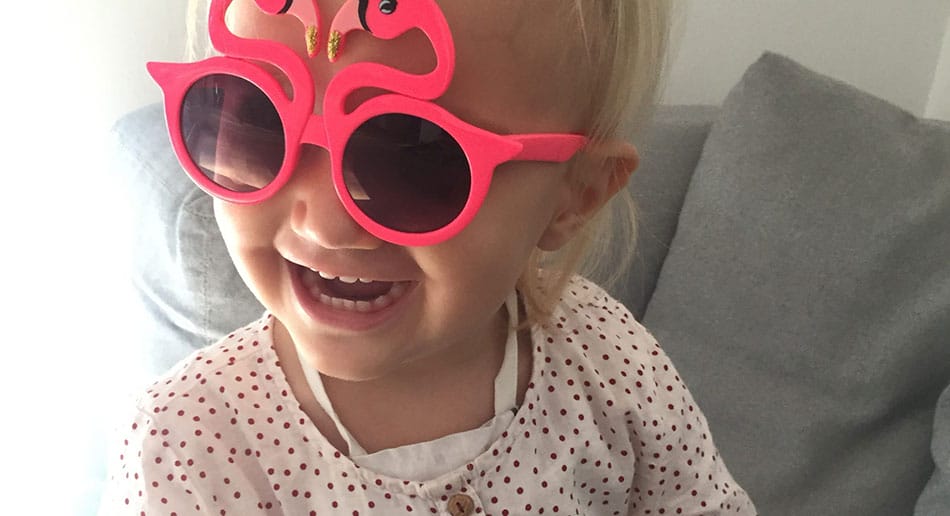
My search history still shows that I googled “rain pants”.
It feels like I’m in another life.
Only three days earlier, I had been thinking about which rainwear would be best for our girl, who loved nothing more than jumping through puddles and making muddy soup.
And now Ava suddenly had cancer.
“This eye has no function. It’s a tumor, come back tomorrow.” “What, like, a tumor? Malignant?” “Yes. We can tell you more tomorrow.”
As if in a trance, we take one step in front of the other, through the long corridors of Vienna General Hospital, outside onto the playground.
Ava finally wants to move again, swing, slide, jump.
No longer having to hold still, pressed onto a cot, her eyes clamped open, all these strangers bending over her, crying, feeling the increasing despair of her parents, who nevertheless try so hard to distract her, singing songs to her, stroking her blonde hair.
Back at home, where nothing is the same as it was four hours earlier, Google tells us what exactly had caused our daughter’s slight squint: retinoblastoma.
In the meantime, Ava’s ophthalmologist has phoned the AKH and then very empathetically gave us a word for the unspeakable.
How naive to think that Ava would only need a patch.
How far away life was when the most pressing concern was finding a pair of rain trousers.
How we wish we had it back.
Ava is 15 months and twelve days old when we get into the car and drive to the university hospital in Graz.
Into the unknown.
We don’t know how long we will stay.
We even have a glimmer of hope that it’s all just a big mistake.
Grasping, sitting, crawling, standing, walking, Ava had learned everything inconspicuously and on time.
Yes, she even picks the tiniest peas from her plate and puts them purposefully into her little mouth.
How can it be that she can’t see out of her left eye?
Why didn’t we notice anything?
Why did our pediatrician just tersely say that it would grow back when I pointed out her strabismus to him?
Why didn’t the pediatrician, to whom we had finally switched based on a gut feeling, make it clear to us that we should consult an ophthalmologist sooner rather than later when she noticed that the reflexes in Ava’s eyes were not the same?
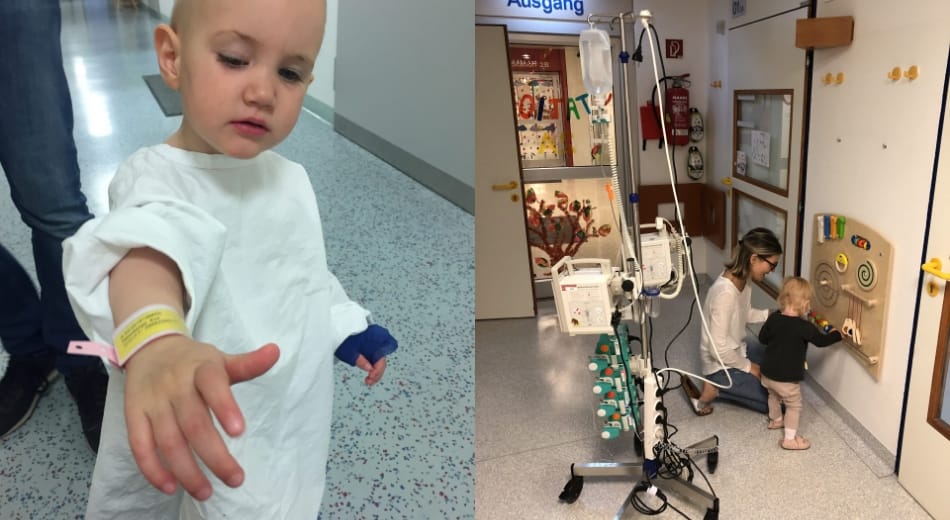
It’s 7.45 a.m. two days later when we dress Ava in a little white surgical gown.
“Look, such a nice dress, you can wear it now!”
My heart is pounding.
We look intensely and consciously into her left eye again and again.
We say goodbye.
We thank him for giving our daughter her unmistakable look, her mischievous gaze.
“She has such beautiful eyes, really steely blue.”
How often have we heard this sentence since Ava was born?
The Dormicum takes effect and Ava becomes woozy and sleepy.
I carry her, her gray knitted blanket wrapped around her, Christian’s arm around us.
The heart rate monitor around her right big toe beeps, the elevator takes us to the catacombs of the children’s hospital, where a small transport train is waiting to take us underground from the children’s oncology department to the eye clinic.
It’s loud down there, the lights fly past me, Ava in my arms gets heavier and heavier, I keep humming the song I sang to her when she was still in my womb.
Ava, you are the star of my eyes, Ava, I love you so much, Ava, oh dear Ava, I can only be happy with you alone.
When I finally have to hand our child over to the senior doctor, I break down.
“My child, my child!”
We cry and hold each other.
A nurse brings us sedative drops.
It is the longest two and a half hours of our lives.
We go outside, walk aimlessly around the hospital grounds, get something to eat, we need to recharge our batteries for everything that is to come.
The sun is shining, smiling people pass our way, unsuspecting.
Their lives go on while ours have come to a standstill.
Finally, we sit down on a bench in front of the eye clinic, a cab pulls up and my mom gets out.
How infinitely happy I am to feel her in this moment.
The door of the clinic opens again and again, finally the senior doctor comes out, approaches us and assures us that the operation went without complications.
We cry and long to finally be with our child again.
Ava Augenstern is born.
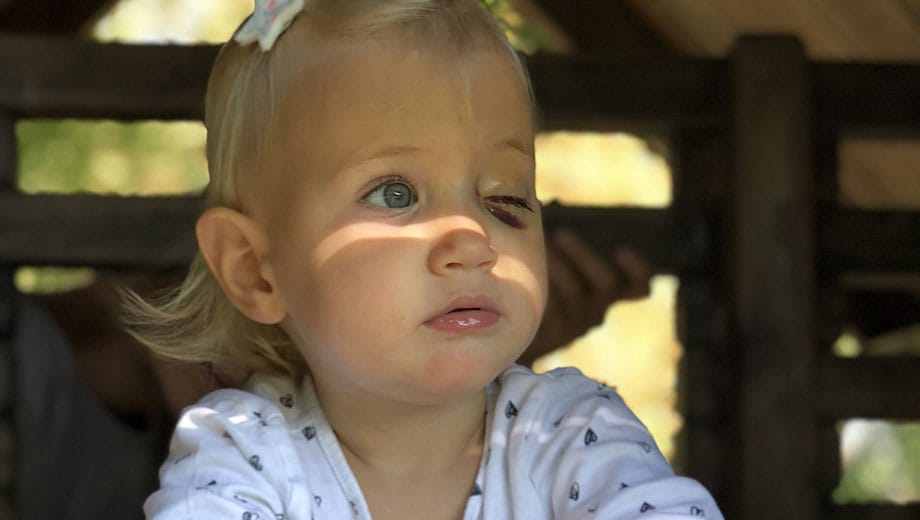
What follows is almost unbelievable for us.
Two hours after Ava woke up with a thick bandage around her left eye, she was whizzing around the ward on a red bobby car.
Grandma’s home-baked cookies in her mouth.
We are amazed.
And inwardly banish the tumor to the deepest of all valleys, bury it under heavy, large stones and bid it farewell.
We try to focus on the fact that the tumor is now gone and not on what Ava had to give for it.
The next day the bandage is removed, Ava’s eye is swollen, bloodshot and closed.
It looks as if she has had a wild fight.
In any case, our strong girl has won the battle against the tumor.
“You are going home with a tumor-free child,” confirms the senior physician.
And he adds a sentence that will remain etched in our minds and keep us going: “This child will live!”.
Back at home, a surreal time between fear and hope begins.
The tumor tissue is now being examined to determine whether chemotherapy will be necessary or not.
We try to remain optimistic, it’s actually already enough.
At the same time, we have to think about how we want to deal with Ava’s illness on the outside.
On the first day we tape her eye, it’s like protection for Ava and us.
We hardly have any words for what has come over us so suddenly.
How are we supposed to face the questions of others?
On day two, we decide to go out without a bandage.
The sooner and more openly we learn to deal with what is now part of our lives, the easier and more natural it will hopefully become for Ava too.
Our optimism is rewarded a little later: the pathologist in Graz decides that no chemotherapy is necessary.
We cheer and dance, invite friends over and celebrate life.
A week later, my cell phone rings and the number for the university hospital lights up: “Please sit down.”
I’m just about to put Ava down for her nap when the oncologist and the psychologist try to explain to me as gently as possible that the pathologist in Essen, who had also examined Ava’s tumor tissue, disagrees with his colleague in Graz: Ava needs adjuvant chemotherapy, only three blocks instead of six, a kind of safety regimen.
I am stunned, angry and terrified.
Ava is tired, she cries.
Hadn’t the oncologist told us during our last consultation that it had never happened before that the second opinion differed from the first?
Christian comes home looking calm and composed.
Before we can really realize what this news will actually mean for our lives over the next few months, we decide to take Ava to the fairytale park at the weekend, to be with people again, to have fun, to enjoy a carefree life.
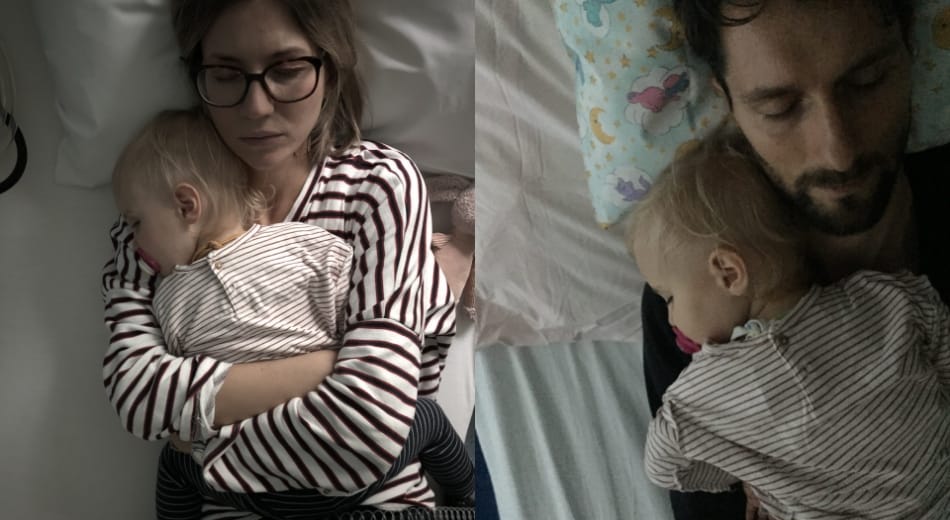
Ava tolerates the chemo surprisingly well.
We are allowed home between the blocks and the beauty in all our pain becomes visible.
Our dachshund is allowed to move in with my sister, an act of love that we can hardly put into words.
Every day the letter carrier brings a new parcel for Ava, our cell phones flash incessantly, so many people are with us, offering us their help.
Ava is only allowed outside with a face mask, and we are told to avoid visits from other children, supermarkets and other crowds.
Christian takes time off work to be with us.
My mom also supports us as often as possible.
We get inventive and our apartment becomes an adventure playground.
With every chemo, Ava gets a little paler and her straw-blonde hair a little less.
After the second block, she needs a blood transfusion and has red cheeks again afterwards.
A miracle.
After block three, Ava is visibly weakened and develops a fever.
We spend three more days at St. Anna Children’s Hospital in Vienna and are not allowed to leave the hospital room for 24 hours.
Our strength slowly dwindled.
Nevertheless, our strong child will never lose his smile and that gives us the energy to carry on.
Always with humility and the knowledge that we are still in a good position compared to many other small cancer patients.
After a platelet transfusion, things are looking up and Ava is recovering visibly.
“You’ll see, by Christmas you’ll have made it.”
It is snowing when Ava is allowed outside without a face mask for the first time.
It’s great to finally see all of our daughter’s facial expressions again, her laughter when her dad throws snowballs and pulls her through the garden on the sledge.
Three days after Christmas, we go to the supermarket with Ava again for the first time.
She blissfully pushes her little shopping cart in front of her, as if she knows it’s all done now.
Shopping has never been better.
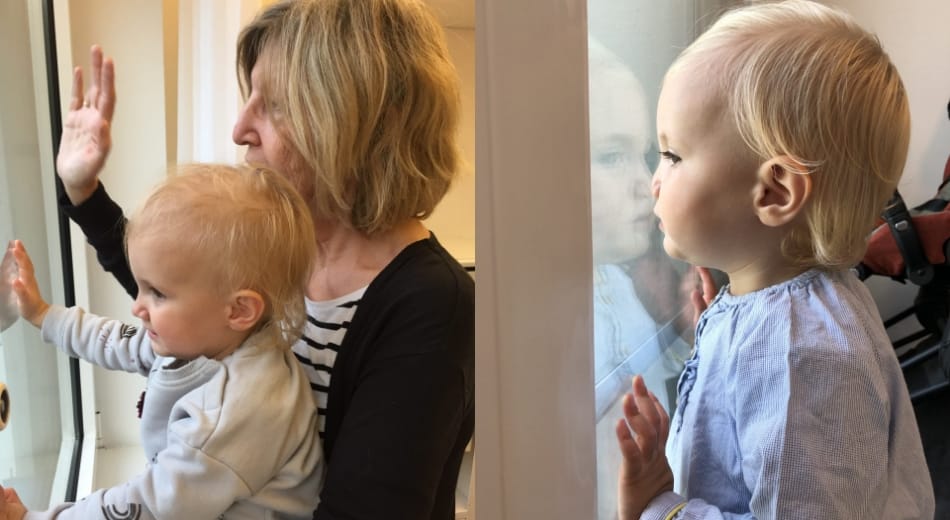
Four weeks ago, I was looking for rainwear online again.
In two versions: for at home and for the nursery.
We have our lives back.
Different than we could ever have imagined, but no less special and happy.
We hardly notice Ava’s prosthetic eye anymore, it is her magic lens and therefore a part of her that we have come to accept and even love.
Our girl balances on narrow walls, rides a balance bike and is determined to climb steps on her own.
The doctors were right: “In kindergarten, she won’t even be able to tell which eye she can’t see out of.”
Ava Augenstern, you are our greatest miracle.
Stronger than the strongest Stark.